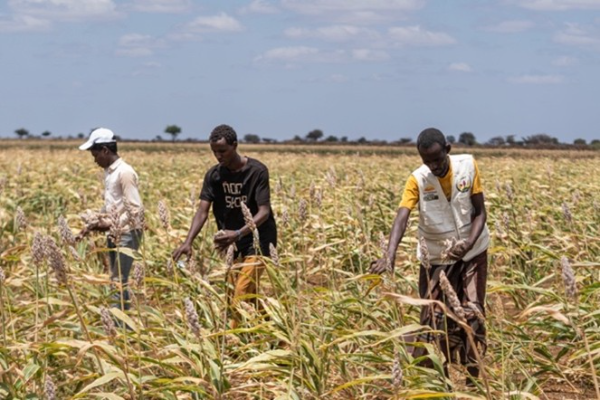
High-yielding and drought-tolerant seeds are enabling Somali farmers in the Bay region to restore their food production and resilience amid ongoing climate-induced droughts.
According to the recent reports by the Food and Agriculture Organization of the United Nations (FAO), the initiative is helping rural communities increase yields and reduce hunger, even as erratic rainfall patterns continue to threaten traditional farming methods.
The seeds, which are propagated by Bay Farmers’ Development Association—an umbrella body representing over 2,500 members in 416 cooperatives—are proving to be a game changer. The association multiplies certified varieties of early-maturing and drought-resilient sorghum (M66) and cowpea (Gadam El Hamam), which are then distributed to farmers across Bay and surrounding regions.
“Before this programme, I used to plant any seed I could find, and most seasons ended in disappointment,” said Isse Sheikh Abdirahman, a farmer from Baidoa. “Now, with these improved seeds, I’m able to harvest even when the rains come late or are not enough. These seeds have given us hope.”
According to the FAO reports, the distribution of improved seeds is part of the Strengthening Emergency Preparedness and Response to Food Crisis (SEPAREF) project, funded by the African Development Bank. The initiative not only provides access to certified seeds but also offers training in sustainable agriculture practices, including seed selection, pest control, harvesting, and post-harvest storage.
“The crops did well despite the low rainfall this year,” Abdirahman added. “We harvested sorghum and cowpeas that are enough to feed our families and keep some seeds for the next season. We will keep planting them.”
For many, the impact of the programme goes beyond improved yields. “This seed is not just food for us—it is life,” said Shukri Ahmed, a member of a women-led cooperative. “We now have confidence that we can survive droughts, and we are even teaching other farmers how to use these seeds.”
FAO reports that the project has increased seed access and strengthened local seed systems. Through its collaboration with a private seed company and Bay Farmers’ Development Association, cooperatives are now producing and bulk packaging the seeds for future use, enhancing local autonomy and sustainability.
“The seeds give us both food and fodder,” said Abdirahman. “This means our animals also benefit, which is very important in our agro-pastoral life.”
Climate change continues to pose serious threats to Somalia’s agriculture, with prolonged dry spells and unpredictable rain patterns undermining traditional crops. According to FAO, supporting local adaptation through climate-smart inputs such as drought-tolerant seeds is crucial to breaking cycles of food insecurity.
Still, challenges remain. Farmers have called for more widespread availability of the improved seeds and continued technical support to expand the success of the programme across Somalia’s drought-prone regions.
Yet the growing confidence among farmers is undeniable. “We have seen the results,” said Ahmed. “With these seeds, we are not just planting crops—we are planting hope for our families and our future.”
As Somalia continues to confront the realities of climate change, the FAO-supported seed initiative offers a pathway to recovery and resilience, putting the power of food security back into the hands of local communities.







